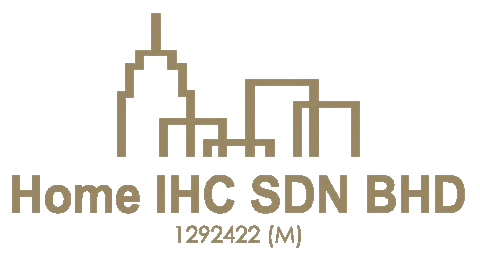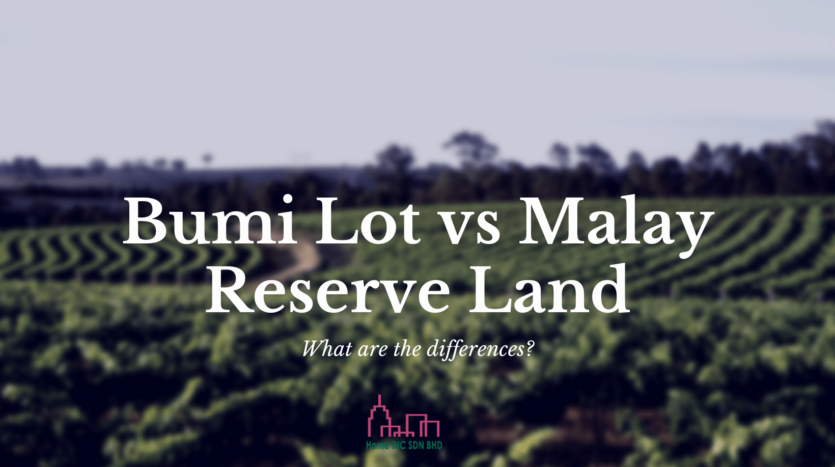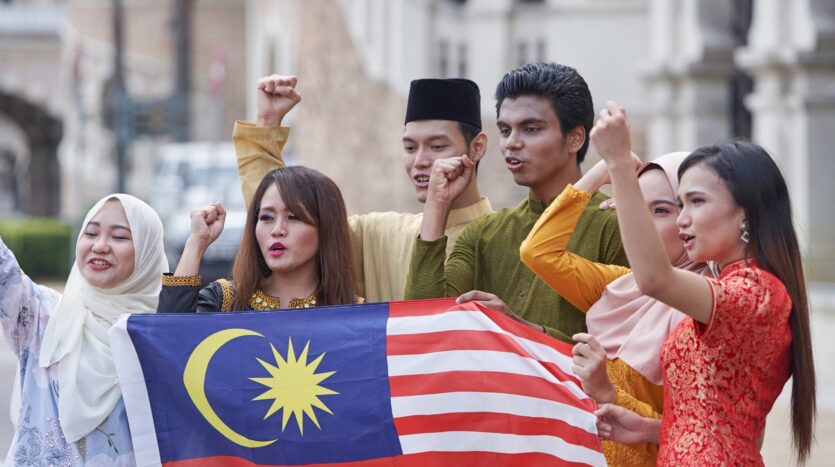Bumi Lot and Malay Reserve Land: What you need to know
Source : https://www.iproperty.com.my/guides/bumi-lot-and-malay-reserve-land-what-you-need-to-know/
By Ashraf Wahab
A common mistake people make is assuming that a Bumi Lot and a Malay Reserve Land (MRL) are the same. Here we detail how that is not the case and everything else you need to know about these two types of lands in Malaysia.
As a multicultural country, purchasing property in Malaysia isn’t as simple as other types of investments. You may run into terms such as Bumi Lots, Bumi Discounts, Bumi Quotas, and Malay Reserve Lands. Whether you are planning to invest in real estate or simply purchase a property to live in, this guide will hopefully shed some light on these important terms.
Who is considered as Bumiputera?
Bumiputera is a term used to refer to an ethnic group in Malaysia that includes Malays, natives of Sabah and Sarawak, the indigenous people (Orang Asli) of Peninsular Malaysia, as well as non-Malay Muslims. From the estimated 28.7 mil citizens in the country, 68.92% or 19.78 mil people are classified as Bumiputeras. In the 1970s, the Malaysian government introduced several policies to favour Bumiputeras, including in areas such as land and property.
What is Bumi Lot?
Bumi Lots are units of land or property, which can only be purchased and owned by Bumiputeras. According to the NEP (New Economic Policy) report, the Bumiputera Lot or Bumi Lot quota was created to increase the percentage of Bumiputera ownership in Malaysia.
Beginning in 1971, property developers in Malaysia must allocate at least 30% of the total unit numbers, regardless of whether they are residential or commercial properties, to Bumiputeras.
However, all land matters under Malaysia law fall under the jurisdiction of State Authorities. Therefore, the Bumi Quota may differ from state to state. For example, the Federal Territory of Kuala Lumpur has the Bumi Quota set at 30%.
What is Bumi Discount?
A related regulation is the Bumi Discount which is a mandatory minimum discount offered to Bumiputeras on property. As is the case with Bumi Quota, land laws fall under the jurisdiction of the State Government and therefore the amount will differ between the various states.
Below is a summary of Bumi Quota and Bumi Discount according to states:
| State | Bumi Quota | Bumi Discount |
| Perlis |
|
– |
| Kedah |
|
Minimum 5% |
| Penang | 30% for all properties | 5% for all property stages |
| Perak |
|
Minimum of 5% discount except for low-cost property |
| Selangor |
|
|
| Kuala Lumpur | 30% for all housing and commercial projects | 5% |
| Negeri Sembilan | Minimum 30% for housing and commercial projects | 10% (except low cost) |
| Melaka |
|
5 – 15% |
| Johor |
· 40% for selling price <RM200,000 · 30% for selling price >RM200,000 but <RM300,000 · 20% for selling price >RM300,000 |
15% |
| Pahang | Minimum 30% depending on State Exco’s decision based on the location of the project. | – |
| Terengganu |
|
7 – 7.5% |
| Kelantan | Mostly are Malay Reserve Land | – |
In some cases, instead of marking certain units as Bumi Lots and advertising them as such, developers will draw up the list of Bumiputera buyers. Following the buyer’s consent, they will then ‘mark’ certain units as Bumi Lots.
This where the Bumi Discount comes in; to be able to purchase the property using the Bumi Discount, the buyer must provide consent to ‘mark’ the property as a Bumi Lot. One important factor to keep in mind is that these discounts are only valid for new purchases directly from the property developers, and not for sub-sale units.
How to sell Bumi Lot to non-Bumi?
If you want to know if a Bumi Lot can be sold to a non-Bumis, a short answer is “Yes, you can”. However, it will not be easy. The Bumi Lot will need to be ‘released’ and this often takes years and involves many procedures. In many cases, most requests are also rejected.
An application for consent to transfer can be submitted to the Land Office. You’ll need to provide convincing reasons, such as no demand for the property even after years of advertising. If the initial application is rejected, you can submit an appeal. If it’s successful, the buyer would be required to reimburse the developer with the discounted amount from the initial purchase.
Can Bumi Lot be converted to a non-Bumi Lot?
An important detail to keep in mind is that a “released” Bumi Lot does not make it a non-Bumi Lot. Once the non-Bumi owner of the Bumi Lot chooses to sell to another non-Bumi, he will need to apply again for the Land Office’s consent for the transfer of ownership.
How to check Bumi Lot status?
Buyers who are looking to purchase properties should always ask developers if their properties are endorsed as Bumi Lots or are on Malay Reserve Land. Always check with the Land Office for various matters regarding the property before you decide to purchase.
What is Malay Reserve Land (MRL)

A Malay traditional house in Kampung Baru. Among the Malay Reserve Land that still exist in the Federal Territory of Kuala Lumpur is Kampung Baru, Kampung Kerinchi, Kampung Datuk Keramat, Segambut and Kampung Padang Balang. © Tom Bryan/ gettyimages
Although often mistaken for Bumi Lots, MRL is a different type of land title. Also known as “Tanah Rizab Melayu”, it can only be owned and held by Malays as stated under the Malay Reservation Enactment 1913. Other characteristics that distinguish MRLs from Bumi Lots include:
- Malay owners are not allowed to rent out properties built on MRLs or the lands to non-Malays
- All businesses that operate on MRLs must be owned by Malays
Malay Reserve Land issues
There is great potential in the development of these MRLs especially reserve land located in urban and suburban areas. However, several obstacles are standing in the way of developing these MRLs, including:
- Multiple ownership
Most of the MRLs are facing the problem of multiple ownerships due to Islamic inheritance laws. A Malay family divides inheritance, including land, according to Faraid law. Therefore, all those concerned will have to agree to the terms of the sale or lease of the land.
- Compensation
According to Land Acquisition Act 1960, compensation to the residents must be made according to fair market value. Some of the reserve lands have very strategic locations (such as Kampung Baru), but due to the restriction on dealings and its “non-transferable to non-Malay” status, the market value of the land has been depressed.
- Concerns of the Malay community
In most of the Malay residents’ eyes, the Malay reservation is significant to the Malay community’s identity and dignity. Therefore, they believe that development should not come at the expense of Malay identity and rights or the descendants of the original settlers and the present landowners.
Can Malay Reserve Land be released and sold to non-Malays?
The major difference between a Bumi Lot and a Malay Reserve Land is the latter CANNOT be charged to a non-Malay individual/ corporate entity. This provision is among the privileges guaranteed for the Malays under the Federal Constitution. It was also one of seven messages contained in the Wasiat Raja-Raja Melayu that was agreed upon by the Malay Rulers on Aug 5, 1957.
Under the Malay Reservation Enactment 1913, covering the Federated Malay States of Selangor, Perak, Negeri Sembilan, and Pahang, all land declared as Malay Reserve Land “cannot at any time be sold, leased or handed over to any person who is non-Malay” unless it is declared and enacted to be void by the Menteri Besar.
The other Malay States implemented their Malay Reservation Enactments at different times – Kelantan in 1930, Perlis (1935), Johor (1936), and Terengganu (1941). However, an exception to this rule can be found in Kedah, as seen in a Federal Court case between Affin Bank Bhd v Jamaludin Jaafar; The Association of Banks in Malaysia & Anor (Interveners). The court concluded that the land can still be charged to a non-Malay, provided that the rights of the land are not transferred to a non-Malay.





